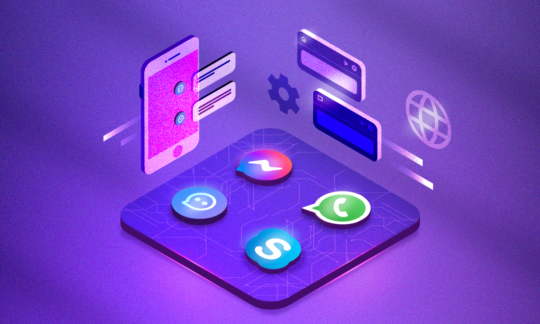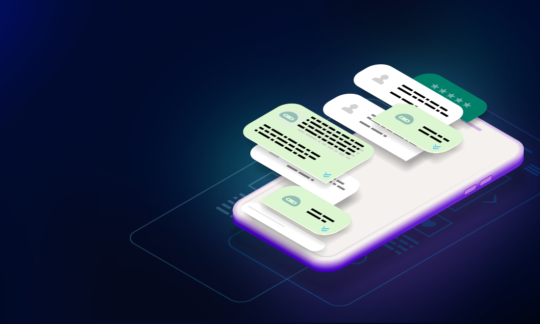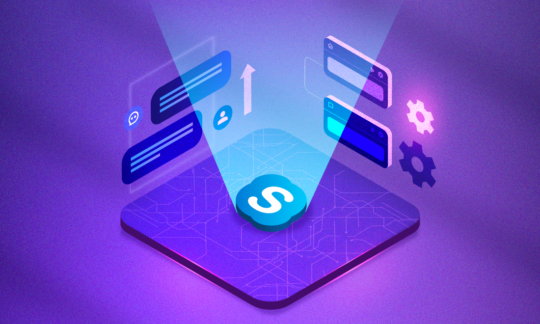11 ways in which voicebots can automate business operations
Did you know that according to research, businesses plan to spend 50% more on chatbots than on mobile apps? This is hardly surprising, considering the fact that they are expected to bring cost savings of $8 billion by 2022. Their use cases go beyond customer self-service: you can use them for lead qualification, database updates, scheduling demo calls, and more.
In today’s article we’re going to take a look at how you can use voicebots to automate your business operations. Let’s get started, shall we?
11 ways voicebots can help automate work
Voicebots, sometimes called IVR chatbots (IVR standing for Interactive Voice Response) are taking the business world by storm. This isn’t surprising – they’re immensely useful in many scenarios. Let’s start off by looking at one of the most challenging customer communication processes – call deflection.
#1 A more effective & user-friendly call steering process
According to a study by Business Insider, as many as 59% of customers prefer customer self-service over calling client support. No wonder – with the wrong call deflection process, people spend a lot of time waiting for someone to pick up, only to be once again put on hold before being connected to the right department. Here’s where intelligent call routing comes to the rescue.
So, how does it work? At the start of a call, your callers will be immediately connected to an automatic voice assistant who’ll ask them what they’re looking for. If you choose an AI-powered solution like SentiOne, the bot will be able to understand their intent at an exceptional 96% accuracy rate. If they won’t be able to help out themselves, they’ll transfer the call to the right department. This leads us to the next use case.
#2 Handling frequently asked questions and customer self-service
Voice assistants are more powerful than you might imagine. IBM calculates that with an AI-powered solution, you’ll be able to automate responding to up to 80% of repetitive queries. As a result, you’ll take a lot of the burden off of your support team, giving them time to handle more demanding tasks.
The same IBM study also proves that there’s a clear link between IVR automation and savings. It underlines that companies “spend $1.3 trillion to answer 265 billion customer service calls each year — and deploying conversational AI can cut costs by 30%”.
You might now be wondering: “This is great, but what about scenarios that call for customer identification”? Let’s answer this next.
#3 Automating user authentication
In some industries, customer communication is virtually impossible without identifying the caller beforehand – think of accessing bank account details, or patients inquiring about their blood test results. An IVR automation solution will be able to handle this essential process for you. If the bot isn’t able to answer the query and passes it on to a human assistant, your team will also get access to the customer’s CRM profile even before they answer the call.
#4 Available 24/7
Another perk, especially for businesses with clients around the globe, is that the hotline can operate around the clock. Businesses no longer have to worry about time-zone differences. Since a 2020 NICE InContact study proves that almost 40% of client interactions are fully automated, it’s clear as day that implementing IVR automation pays off.
#5 Using IVR automation for lead qualification and CRM updates
Another great use case for a voice bot is keeping your CRM up to date, which makes lead qualification easier. Imagine a scenario where someone from your sales team calls a customer to sell them a product upgrade, but it turns out that their contract was terminated 3 months ago. If you had an IVR chatbot that would regularly call customers and prospects to make sure their data is up to date, then such a situation could have been avoided.
#6 Handling outbound sales calls
Unlike in ye olden days, your sales representatives don’t have to manually conduct cold calling. Instead, they can have the IVR chatbot dial out, present the offer, and – if the person they’re speaking to shows interest – the call can be redirected to the salesperson. Since quality wins over quantity, it’s best if your team can spend more time interacting with each client.
Contrast this with what you’d have to do without a voicebot: waste time on endless rejections while cold calling. It’s easy to see why there’s only one sensible choice here.
Of course, there’s a flipside: under no circumstance call somebody who never agreed to be contacted automatically. We refer to that practice as “robocalling”, and it’s the worst idea you could possibly have. There’s no better way to kill any goodwill a customer might have towards you than to just spam them with calls they never asked for.
#7 Scheduling meetings with prospective buyers
According to a study from Xant Labs, salespeople spend only 36.6% of their time actually selling things. The remaining time is spent on admin tasks (including prospecting) CRM updates, scheduling demo calls, etc.
The good news is, you can easily change that by investing in an IVR chatbot. It can be used to call leads and scheduling demos with prospective buyers. This will give your salespeople more time to prepare for demo calls and build better relationships with customers.
Remember, though: do not spam people. Only contact those leads that have given you clear consent for being contacted in such a manner.
#8 Collecting customer feedback (both quantitative and qualitative)
Very much like in the case of outbound sales and lead generation, IVR automation could be used to run customer satisfaction surveys. If you use a voicebot like SentiOne, which understands natural speech, you’ll be able to collect not only answers to closed-ended questions but also qualitative responses. These insights will prove invaluable as they help you improve both your product and your CX.
#9 Updating supplier databases at scale
Data is useful as long as it’s up to date. However, keeping large datasets relevant can be quite a challenge.
Let’s imagine you manage a chain of restaurants or catering marketplaces. To make sure that nothing interrupts your supply chain, you can use a voice bot to call various food producers or restaurants asking if they offer specific products, or if they still want to use your services, etc.
This way you’ll be able to keep everything under control – the entire process will be completed in a much shorter time than if you decided to do it manually. It also means that you can update your database more frequently.
And once again: this is to be done only if the other parties consented to being contacted in this manner.
#10 Optimizing product demos
If you have ever been in sales then you know how hard it is to schedule a demo call. As mentioned earlier, it takes a lot of time and effort – and a salesperson’s time is very precious.
Every “no show” is potentially a lost sale. IVR automation can help you do two things:
- keep the “no show” rate under control by calling your prospects and reminding them about the demo call, and rescheduling it, if necessary
- give your salespeople more time to prepare for the calls instead of wasting their time calling leads.
#11 Automating student applications
Universities and other educational institutions tend to manage large volumes of data – especially when the new academic year is about to start, and hundreds of student applications start to flow in. All of them have to be processed in a timely manner and kept up to date. This involves a lot of manual work, which can be easily performed by an IVR chatbot. Not only is it able to answer student queries but it can also update application statutes, leaving university personnel more time for value-adding activities.
Summary
As you can tell from the 12 use cases above, using an IVR automation tool can immensely improve your company efficiency. If you use a conversational AI solution like SentiOne, you’ll be able to make the most of what AI and human expertise bring to the table. Voicebots can:
- optimize your call steering thanks to intelligent call routing
- relieve your support team from answering frequently asked questions
- handle outbound sales campaigns, at scale
- update your customer & lead databases
- and much more.
Interested in listening to a few conversations between humans and AI-powered bots? Reach out – we’ll be happy to schedule a free demo!



